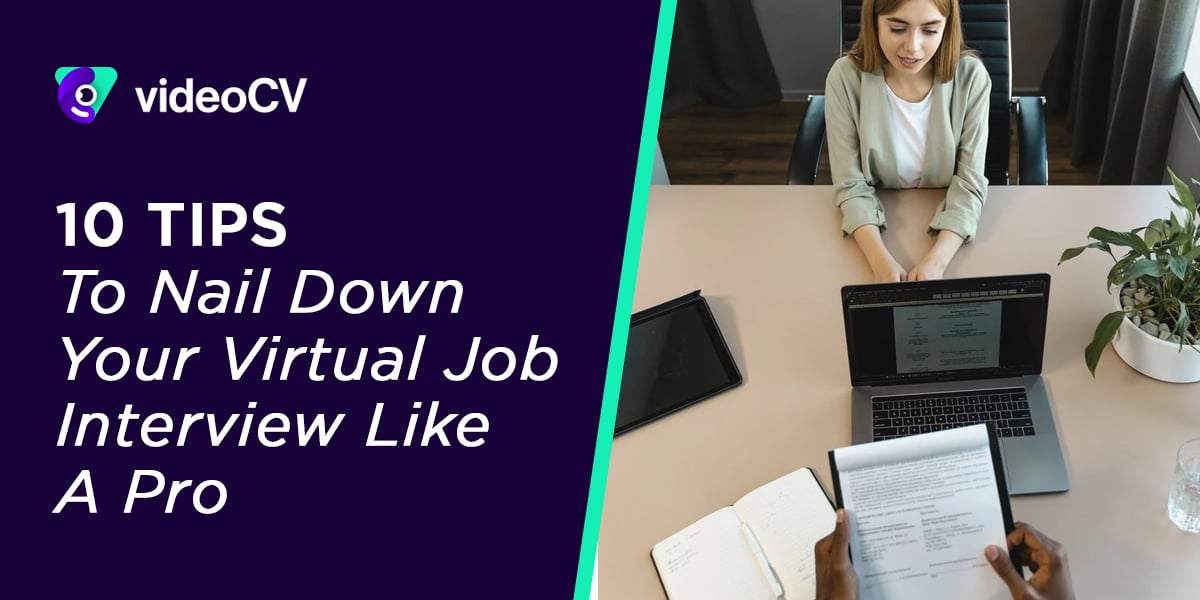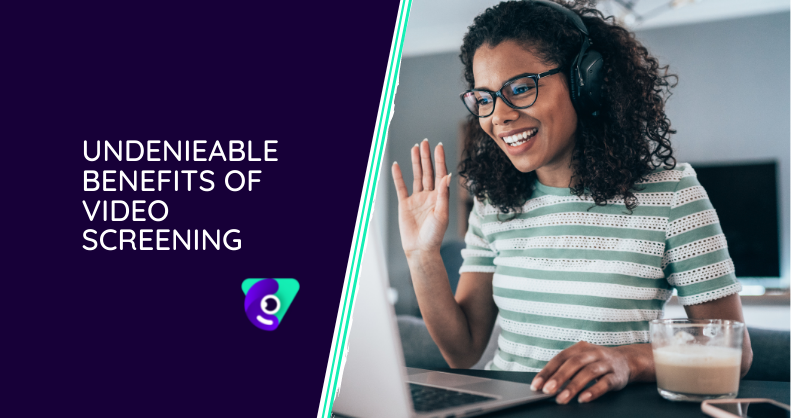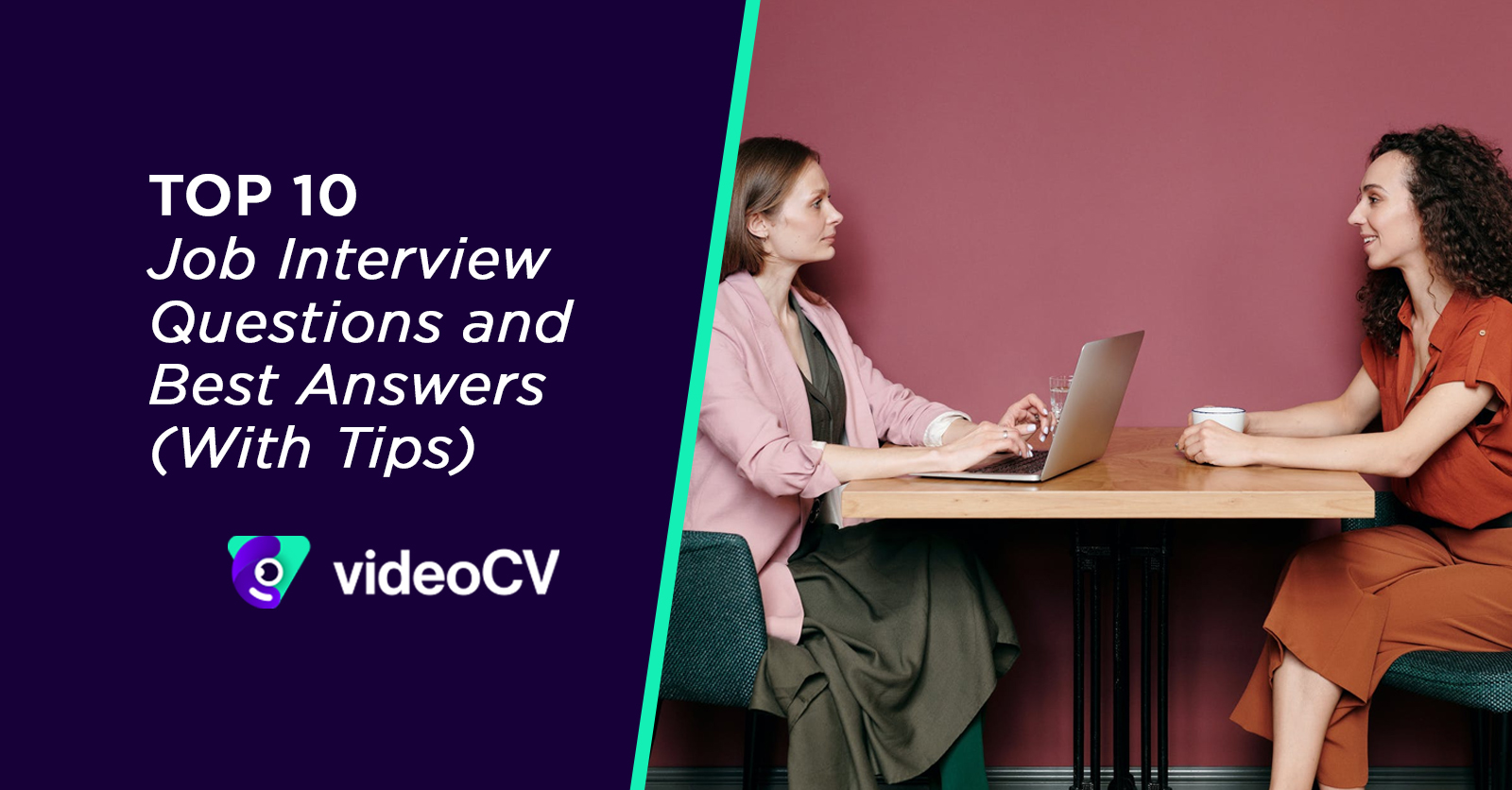8 Tips To Nail Down Your Virtual Job Interview Like A Pro.
Wondering how to ace a virtual interview? You’re not alone- since 2020, there has been a steadfast increase in online video interviews. 60% of recruiters are now hiring through video interview and screening tools.
What do you do once you’ve applied for that dream job? You wait to receive the email saying you’ve made the interview round, then you need to prepare for your virtual interview. It’s easy to get nervous during these interviews, but by following our 8 tips to rock a video interview like a pro, you can relax and shine during your interview, so it will go as smoothly as possible.
What is a virtual interview?
So, you’ve been invited for a virtual interview by a company that you really want to work for.
And now you’re wondering how to do well in a video interview.
A virtual interview is an interview that takes place without having to physically be in the same location as the other people involved. They are typically over the phone or online, instead of in-person.
While there are some similarities to traditional interviews, the technology allows for a more collaborative process between candidates and employers. It’s common to think that there are fewer social cues to rely on when conducting a virtual interview, but this is hardly the case. The amount of non-verbal language that signals interest, enthusiasm, or hesitation should be considered equally as important as the spoken words.
If your job search has taken you to the digital doors of a virtual interview, you know how nerve-wracking those sessions can be. They're not as easy as they look, and too often, candidates who were perfectly on-point and on-brand with their virtual interview land on the hiring manager's "no" pile.
If you want to avoid that “no” pile, use these tips -- whether you want to know the best way to prepare for a video interview, how to sit in an interview, or just know the best practices for virtual interviews, use this guide to help you know how to ace a video interview:
1. Testing, testing… one, two. three
Before a virtual interview, make sure your equipment is working and you have a strong internet connection.
Use a computer with a clear screen and proper lighting. You’ll also want an internet connection that can handle live streaming. You should test out your communication devices at least one day before your interview, and make sure you have a reliable internet connection and that you have the correct and necessary software. Make sure you know which software or platform you will be required to use, and that you can navigate it with ease. Feeling comfortable with the software or program is the first step in ensuring you will feel comfortable in the interview itself.
You need to have a computer setup that meets the specifications of the video streaming platform you want to use. Or in other words, your computer setup should be able to handle your video streaming activities in the best way possible.
In the 15 minutes before the interview, check your internet connection and sign in to the audio/visual meeting provided by the HR representative or hiring manager. Even if you checked the connection the day before, make sure you take at least 15 minutes before the interview to triple check your technology is tested and ready to rock and roll.
2. Eliminate possible distractions
Choose a quiet, distraction-free environment so you can give your full attention to the interviewer. Aside from making sure your space is distraction free for you, you want to do the same for your interviewer. Ideally, you want to allow the interviewer to focus on your skills and qualifications, and not on the state of the room you are in. it goes without saying that your environment and background should be tidy!
If you don’t have a home office yet, try setting up in a spare bedroom or a nook in the basement. Just make sure to section off a small part of the main home so you have your own private area to set up for a working environment.
It is also important that you place your laptop on a table or desk, instead of on a sofa or your lap. Let the people you share space with know when and where you'll be doing your interview.
3.What to wear?
Even though you are preparing for a virtual interview, you should dress appropriately. Sure, we have progressed beyond the constrictive ideas of suits and ties (especially in many startup companies) but that does not mean you should not dress for success.
Professional attire may have evolved beyond the ties, but where does that leave us today? Dressing for a remote interview should be approached the same as if you were dressing for a face-to-face or in person interview. It’s a good idea to follow the general rules of dress you would follow in a face-to-face interview. Leave your jeans and T-shirts in your closet and don a collared shirt and professional attire. Dressing the part will put you in a more professional frame of mind.
When you feel prepared and confident, your demeanor will reflect it. If you don’t know what to wear, try business casual. Business casual is the best way to look professional and feel comfortable for your video call interview.
4.Prep for possible answers
If you don’t take the time to prepare for some possible questions and answers, then you are setting yourself up for a bad video interview.
Before you go to an interview, make sure to research the company and prepare some questions about it. Research in advance to increase the odds that you’ll win over the interviewer.
Although you can have notes by your side to help stimulate the conversation and your answers, it’s very important that you are able to have natural conversations without too much hesitation. You shouldn't have to rely on a script or memorization for your interview. But this is where the preparation can play a significant role- instead of memorizing your possible answers or questions, do the type of research that gives you an understanding about the company and yourself in relation to the job. This is the best form of preparation- because the answers you give and the questions you ask will be genuine and the interviewer will be able to pick up on that.
You might also find that the interviewers or hiring manager will send out a list of questions before the interview. This can be both a blessing and a curse, depending on how you approach it. Again, it is essential that you don’t rattle off the answers like you are reading from a script. Understand what the questions are really asking, and then understand what type of answer you will give. Have your answers prepared in the event that you will need to use them as prompts, but be careful not to memorize them and repeat them in parrot fashion. When employers give you lists of questions, you can use the lists to brainstorm what you want to say.
If you are not given a list of questions in advance, make sure to write out answers beforehand for the most common interview questions. If you find yourself in this situation, do some research on the company and prepare by reading our article on the Top 10 Job Interview Questions And Best Answers (With Tips)
5.What is your body language saying?
You can tell a lot about someone by the way they present themselves. First impressions matter, and the way you present yourself can make or break your opportunities.
Your body language is one of the first things an employer notices about you. Never underestimate your body language just because your interview is being done via video. These tips can help you make a great first impression:
- When you’re in a job interview, it’s helpful to be aware of your body language and how it can influence the people you’re talking to. Take a quick but deep breath and think before you answer difficult questions so that you give the best possible response.When in a tough interview situation, be friendly. Take a deep breath if you need to and respond calmly to any tough questions.
- Remember to use good posture, and look straight into the camera. Good posture allows you to be comfortable, confident, and ready to take on the interview. Sit up with your back straight, and your face is in the center of the screen, without too much open space above your head.
- At most in-person interviews the interview will commence and finish off with a handshake and a greeting. When you are preparing for a video interview, think about how you can establish rapport without a physical handshake.
- The most important body language cue for establishing rapport is eye contact, which shows that you are paying attention to the other person. Don't just give a small wave and a mumbled "hi". Instead, smile and greet with an air of enthusiasm. The secret to success is making a great first impression. So, start off by smiling and giving a confident wave and you’ll be on the right track.
6.Build the relationship & rapport
If you're trying to get a new job, it's important to connect with the interviewer on a personal level so that you'll appear more than just another candidate. The number of candidates for a job is usually extremely high, especially in the current job market. That's why it's essential that you connect with your interviewer on a personal level to show that you're the best of all the people who applied.
When you have a face-to-face meeting, your appearance, body language and early conversation all influence how well it will go. And it is pretty similar when it comes to a remote interview too, but you have to make some slight adjustments. When communicating virtually, it's still possible to establish rapport. Learn how to have a successful interview by preparing in advance and researching the company to find a commonality, asking your interviewer about the atmosphere of the virtual interview, or finding other ways to make yourself at home on screen.
7.Authenticity over perfection, always
Plenty of companies will evaluate you based on how well you can communicate, and so it is important to be authentic in how you communicate who you are and the skills you have.
A remote video interview gives you the opportunity to showcase yourself in an environment that you can feel comfortable in, in fact- it's one of the top benefits of remote interviewing! In some cases, you can even answer questions by recording video responses through video screening tools. This helps people like you to feel relaxed, answering and recording responses in your own time and with ease. There is another advantage to this that benefits both the interviewer and you (the interviewee): Being at ease helps you to be authentic. This is a top trait that hiring managers are looking for and so leveraging your video interview or responses can help you land the job.
When you communicate with other people, whether in an interview or other context, you'll want to make sure to express yourself appropriately, but most importantly, authentically. Whether it's for a role in marketing, sales, or engineering, recruiters will pay close attention to your ability to communicate. Recruiters are also experts at seeing through facades, and will be able to identify who is being authentic, and who is not.
Remain professional, but let your personality and confidence shine through- this will not only help recruiters to identify you as a key candidate, but will help you to land a position that will genuinely be a good fit for you and your career goals.
8.Reach out & follow up
Reach out with a follow-up email 24 hours after the interview to express appreciation for their time and to let them know you're available if they have any additional questions. Send an email to the HR representative or hiring manager, asking for a complete list of your interviewers’ emails. Once you have your interviewers’ emails, you can reach out to them directly for a thank you or a follow up.
The Bottom Line
Virtual interviews are where the magic happens, thanks to technology that gives you all the power of face-to-face interviews, with none of the sweat. Remote interviews are fast, cheap, and convenient. They allow recruiters to interview many candidates at the same time, without having to travel to each location. This guide is filled with online interview tips- and we’re confident you can use it to your advantage. With this guide by your side, you should now know exactly how to ace a virtual interview.





